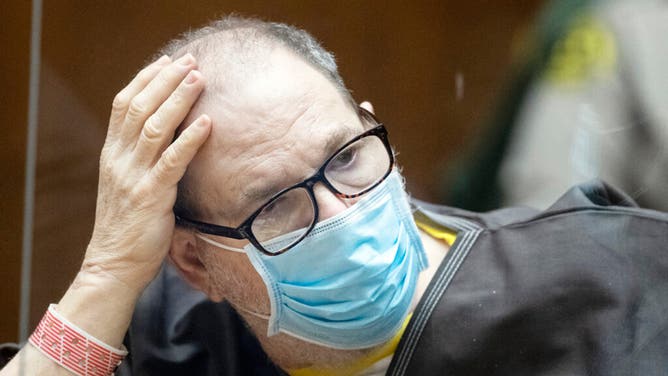Never Forget How Press Failed Hollywood Starlets In Harvey Weinstein Case
Harvey Weinstein’s reign of terror is over, thank goodness. Could it have ended years earlier, though, sparing countless starlets his predatory advances?
A chilling refrain after Weinstein’s fall suggested such a scenario.
They knew, many cried, from comedians like Bobcat Goldthwaite to others aware of the “open secret.” Quentin Tarantino heard about the mega-producer’s behavior via his former flame, Mira Sorvino. Brad Pitt even threatened Weinstein after hearing how he pulled his predatory moves on Pitt’s girlfriend at the time, Gwyneth Paltrow.
Others knew, too, and these folks were in a far better position to blow the whistle on Weinstein’s actions: journalists.
Reporters finally caught up with his crimes in 2017, an effort so consequential they even made a movie about it.
This fall’s “She Said” details how New York Times reporters Jodi Kantor and Megan Twohey (played by Zoe Katan and Carey Mulligan) exposed Weinstein’s sins for all to see, along with heroic work from Ronan Farrow at The New Yorker magazine.
https://www.youtube.com/watch?v=i5pxUQecM3Y&t=2s
The film has a perfect companion piece: journalist Ken Auletta’s new book, “Hollywood Ending: Harvey Weinstein and the Culture of Silence.” “Hollywood Ending” explores how the industry’s unwillingness to speak out against the producer kept him in business, in more ways than one.
Auletta spoke to Bulwark podcaster Sonny Bunch about his findings. Some of the revelations from that interview are infuriating.
Auletta was one of several journalists who had some, but not enough, of what he continually calls the “goods” on Weinstein. He even accused the “Shakespeare in Love” producer about his possible sex crimes to his face, reducing Weinstein to tears.
“It’s going to destroy my life,” Weinstein told Auletta between heaving sobs.
Auletta couldn’t get the women accusing Weinstein of rape to share their stories on the record at the time.
“The story didn’t run in 2002 because of that,” he adds.
Kim Masters, a veteran Hollywood scribe, similarly asked Weinstein about abuse allegations prior to the Kantor/Twohey expose.
“I heard you rape women,” Masters told Weinstein more than 20 years ago.
And yet what happened next? Nothing, or at least so little that Weinstein was able to keep preying on starlets as he saw fit.
A good journalist shouldn't publish a story that can’t be verified. Any half-hearted attempt to chronicle Weinstein’s actions would have run into a legal buzzsaw from Team Weinstein.
Did journalists quit on the story? Did they spend the ensuing years trying to find the whole truth? It seems likely they didn’t.
The book also recalls the advances Weinstein gave to several groups, including journalists, to what Bunch calls “buy them off” with the Miramax Books shingle. Did that factor in the lack of interest in Weinstein’s story?
“He was giving screenplay contracts to gossip columnists,” Auletta says, adding that included providing exclusive interviews to scribes who didn’t rock the boat.
Did Weinstein’s politics help protect him, along with his ability to sway Oscar voters?
“He was a major power broker in Democratic politics,” Auletta says of both Weinstein's personal ties and sizable DNC donations over the years.

If Weinstein served a similar function for the GOP, would journalists have worked harder to get to the truth?
One thing is obvious.
NBC News did its best to crush the story that finally had enough details to bring Weinstein down. Auletta shares how the corporate news body rejected Ronan Farrow’s Weinstein expose, which dropped days after The New York Times article. Farrow, son of film legend Woody Allen, had three women on tape, plus audio of an Italian model who described an assault from Weinstein, among his proof.
The president of NBC News told Farrow his story wasn’t fit for publication, according to Auletta, but that same story passed muster at the New Yorker.
Auletta notes Farrow's New Yorker story had the same essential "goods" as the one NBC rejected.
Journalists were very close to exposing a serial predator, but it took years, and years, for them to close the deal.
Could that happen again?
Consider how a similar story is currently hiding in plain sight – Jeffrey Epstein. Who was on the late abuser’s list of regular clients? Isn't it curious that critical footage from cameras located outside of his cell got erased?
And why haven’t we learned more about Epstein’s chief enabler, Ghislaine Maxwell, and her clients?
Why isn’t our media trying, 24/7, to expose the predators who worked with Epstein and Maxwell all those years? You don’t need a journalism degree to sense that’s an even bigger story than Weinstein.